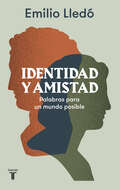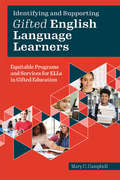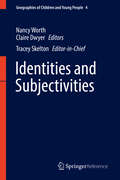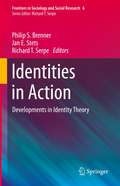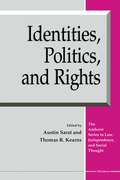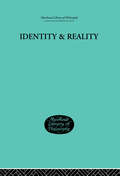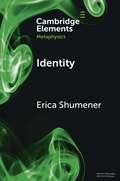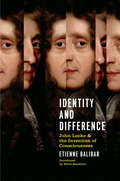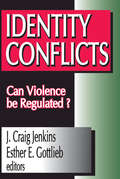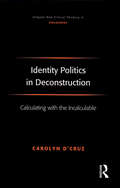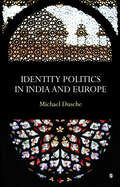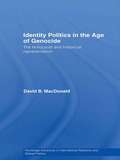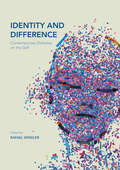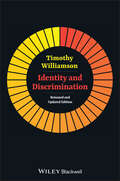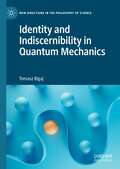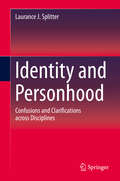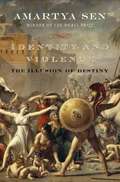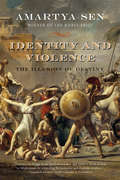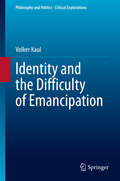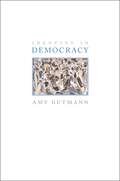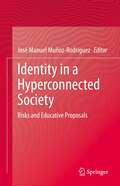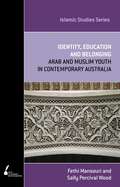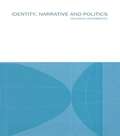- Table View
- List View
Identidad y amistad: Palabras para un mundo posible
by Emilio LledóPREMIO PRINCESA DE ASTURIAS DE COMUNICACIÓN Y HUMANIDADES 2015 PREMIO NACIONAL DE LAS LETRAS ESPAÑOLAS 2014 Un acontecimiento muy esperado: el ensayo al que Lledó se ha dedicado durante los últimos diez años. «En la otra ladera del dolor y la desesperación se dibuja el horizonte sorprendente de la amistad». En uno de los momentos más emocionantes de la Ilíada, Príamo reclama a Aquiles el cadáver de su hijo Héctor. En el tenso diálogo entre ambos, surge un destello de humanidad y Aquiles rinde honores al héroe muerto ofreciendo hospitalidad al anciano padre. A pesar de la guerra, nos dice Emilio Lledó, Homero nos deja atisbar el horizonte de la amistad, «que acoge y sublima el dolor de la muerte». La libertad de las personas guarda una estrecha relación con la libertad de las palabras, pues implica posibilidad de pensar, posibilidad de ser. En este maravilloso ensayo, Lledó juega y conversa con los numerosos términos que la cultura griega nos ha legado, y se detiene en el de amistad, un concepto clave a la hora de explorar quiénes somos. Lo contrapone a otra noción esencial, la de identidad, hoy tan manida y viciada, que, en su origen, lejos de aludir a lo que nos diferencia, se refería a nuestra mirada humana sobre el mundo y sobre nosotros mismos, y es un componente fundamental de la democracia. Lledó rastrea ambos conceptos en las fuentes clásicas, trazando maravillosas conexiones entre ellos -así como con el resto de grandes palabras- y profundizando en sus sucesivas interpretaciones. Al hacerlo, ofrece una lúcida visión de la vida moderna. La crítica ha dicho:«Si hubiera muchos intelectuales como Lledó el nuestro sería un país bien distinto.»Elvira Lindo
Identifying and Supporting Gifted English Language Learners: Equitable Programs and Services for ELLs in Gifted Education
by Mary CampbellThis book is a practical guide for identifying and supporting gifted English language learners (ELLs) based on research and firsthand teaching experience. This book:Presents practical information and strategies for identifying gifted ELLs.Helps readers understand more about potentially gifted behaviors and talents.Supports the enrichment and social-emotional needs of these students.Includes background information, teaching strategies, and methods.Offers ideas for lessons and activities that can be used to support any learner.Research from the last 2 decades shows that there is a considerable disparity between ELLs and native English speakers identified as gifted. This book will inspire action by key players in these students' lives, including English language and gifted educators, classroom teachers, school administrators, district and state leaders, families, and the greater community.
Identities and Subjectivities
by Nancy Worth Claire DwyerGeographies of children and young people is a rapidly emerging sub-discipline within human geography. There is now a critical mass of established academic work, key names within academia, growing numbers of graduate students and expanding numbers of university level taught courses. There are also professional training programmes at national scales and in international contexts that work specifically with children and young people. In addition to a productive journal of Children's Geographies, there's a range of monographs, textbooks and edited collections focusing on children and young people published by all the major academic presses then there is a substantive body of work on younger people within human geography and active authors and researchers working within international contexts to warrant a specific Major Reference Work on children's and young people's geographies. The volumes and sections are structured by themes, which then reflect the broader geographical locations of the research.
Identities in Action: Developments in Identity Theory (Frontiers in Sociology and Social Research #6)
by Jan E. Stets Richard T. Serpe Philip S. BrennerThis volume presents recent developments in identity theory and research. Identities are the basic building blocks of society and hold a central place in every social science discipline. Identity theory provides a systematic conceptualization of identities and their relationship to behavior. The research in this volume demonstrates the usefulness of this theory for understanding identities in action in a variety of areas and settings. The volume is organized into three general areas: ethnicity and race; family, religion, and work; and networks, homophily, and the physical environment. This comprehensive and authoritative volume is of interest to a wide readership in the social and behavioral sciences, including students and researchers of sociology, social psychology, psychology, and other social science disciplines.
Identities, Politics, and Rights
by Austin Sarat Thomas R. KeamsThe subject of rights occupies a central place in liberal political thought. This tradition posits that rights are entitlements of individuals by virtue of their personhood and that rights stand apart from politics, that rights in fact hold at bay intrusions of state policy. The essays in Identities, Politics, and Rights question these assumptions and examine how rights constitute us as subjects and are, at the same time, implicated in political struggles. In contrast to the liberal notion of rights' universality, these essays emphasize the context-specific nature of rights as well as their constitutive effects. Recognizing that political disputes throughout the world have increasingly been cast as arguments about rights, the essays in this volume examine the varied roles that rights play in political movements and contests. They argue that rights talk is used by many different groups primarily because of its fluidity. Certainly rights can empower individuals and protect them from their societies, but they also constrain them in other areas. Frequently, empowerment for one group means disabling rights for another group. Moreover, focusing on rights can both liberate and limit the imagination of the possible. By alerting us to this paradox of rights--empowerment and limitation--Identities, Politics, and Rights illuminates ongoing challenges to rights and reminds us that rights can both energize political engagement and provide a resource for defenders of the status quo.
Identity & Reality
by Meyerson, EmileFirst published in 2002. Routledge is an imprint of Taylor & Francis, an informa company.
Identity (Elements in Metaphysics)
by Erica ShumenerIdentity criteria are powerful tools for the metaphysician. They tell us when items are identical or distinct. Some varieties of identity criteria also try to explain in virtue of what items are identical or distinct. This Element has two objectives: to discuss formulations of identity criteria and to take a closer look at one notorious criterion of object identity, Leibniz's Law. The first section concerns the form of identity criteria. The second section concerns the better-regarded half of Leibniz's Law, the indiscernibility of identicals. The third section turns to the more controversial half of Leibniz's Law, the identity of indiscernibles. The author considers alternatives to Leibniz's Law as well as the possibility that there are no adequate identity criteria to be found.
Identity And Difference
by Etienne BalibarJohn Locke's foundational place in the history of British empiricism and liberal political thought is well established. So, in what sense can Locke be considered a modern European philosopher? Identity and Difference argues for reassessing this canonical figure. Closely examining the "treatise on identity" added to the second edition of An Essay Concerning Human Understanding, Étienne Balibar demonstrates Locke's role in the formation of two concepts central to the metaphysics of the subject--consciousness and the self--and the complex philosophical, legal, moral and political nature of his terms.With an accompanying essay by Stella Sandford, situating Balibar's reading of Locke in the history of the reception of the Essay and within Balibar's other writings on "the subject," Identity and Difference rethinks a crucial moment in the history of Western philosophy.
Identity Conflicts: Can Violence be Regulated?
by Esther GottliebSocial conflicts are ubiquitous and inherent in organized social life. This volume examines the origins and regulation of violent identity conflicts. It focuses on the regulation of conflict: the constraining, directing, and repression of violence through institutional rules and understandings. The core question the authors address is how violence is regulated and the social and political consequences of such regulation. The contributors provide a multidisciplinary multi-regional analysis of identity conflicts and their regulation. The chapters focus on the forging and suppression of religious and ethnic identities, problematic national identities, the recreation of identity in post-conflict peace-building efforts, and the forging of collective identities in the process of democratic state building. The instances of violent conflict treated here range across the globe from Central and South America, to Asia, to the Balkans, and to the Islamic world. One of the key findings is that conflicts involving religious, ethnic, or national identity are inherently more violence prone and require distinctive methods of regulation. Identity is a question both of power and of integrity. This means that both material and symbolic needs must be addressed in order to constrain or regulate these conflicts. Accordingly, some chapters draw on a political-economy approach that places primary emphasis on resources, organization, and interests, while others develop a cultural approach focusing on how identities are constructed, grievances defined, blame attributed, and redress articulated. This volume offers new ideas about the regulation of identity conflicts, at both the global and local level, that engage both tradition and modernization. It will be of interest to policymakers, political scientists, human rights activists, historians, and anthropologists.
Identity Politics in Deconstruction: Calculating with the Incalculable (Ashgate New Critical Thinking in Philosophy)
by Carolyn D'CruzIdentity politics dominates the organisation of liberation movements today. This is the case whether fighting over one's birthright to a nation, such as in the Palestinian/Israeli conflict; lobbying for civil rights, such as in gay and lesbian campaigns for marriage; or struggling for citizenry recognition as currently experienced by asylum seekers. In this book Carolyn D'Cruz investigates the nexus between what David Birch describes as ’the seemingly impossible of high theory and the seemingly accessible possibilities of popular discourse’, as encountered in liberation movements based on identity. D'Cruz reworks the logic of such movements through the unique combination of Derridean deconstruction, Foucauldian discourse and Levinasian ethics. Moving both within and between the domains of philosophy, politics and ’postmodern culture’ this book offers both a clear explication of complex philosophical issues and an understanding of how they relate to the political practicalities of everyday life.
Identity Politics in India and Europe
by Michael DuscheThis book highlights the present perceptions of the East and the West as seen through the eyes of eminent scholars from India, and in doing so, theorises on identity politics. Identity Politics in India and Europe combines qualitative methods (20 interviews) with historical and philosophical analysis. The first part of the book discusses the history of perceptions between the Europe of Latin Christianity and the so-called Muslim world, starting from the 7th century onwards. The second part is devoted to a discussion on the emergence of modernity and how it changed the identity politics of earlier times. The third part explores the role that intellectual elites have to play. It comprises interviews of eminent scholars and thinkers in India such as Imtiaz Ahmad and Ashis Nandy. These make for an insightful read, especially as subtle ideological differences surface in their responses to a set of common questions. The interviews are set in the historical context of the relations between Europe and the Muslim world and analysed from a theoretical angle, drawing from theories of modernity, conceptions of justice and notions of identity politics. The book will be of great interest to the world of social science academia, especially those with specific interest in the history of transnational politics.
Identity Politics in the Age of Genocide: The Holocaust and Historical Representation (Routledge Advances in International Relations and Global Politics #Vol. 64)
by David B. MacDonaldIn an era of globalization and identity politics, this book explores how Holocaust imagery and vocabulary have been appropriated and applied to other genocides. The author examines how the Holocaust has impacted on other ethnic and social groups, asking whether the Holocaust as a symbol is a useful or destructive means of reading non-Jewish history. This volume: explains the rise of the Holocaust as a gradual process, charting how its importance as a symbol has evolved, providing a theoretical framework to understand how and why non-Jewish groups choose to invoke ‘holocausts’ to apply to other events explores the Holocaust in relation to colonialism and indigenous genocide, with case studies on America, Australia and New Zealand analyzes the Holocaust in relation to war and genocide, with case studies on the Armenian genocide, the Rape of Nanking, Serbia and the Rwandan genocide examines how the Holocaust has been used to promote animal rights. Demonstrating both the opportunities and pitfalls the Holocaust provides to non-Jewish groups who seek to represent their collective histories, this book fills a much needed gap on the use of the Holocaust in contemporary identity politics and will be of interest to students and researchers of politics, the Holocaust and genocide.
Identity and Difference
by Rafael WinklerThis book provides a persuasive account of how identity and difference factor in the debate on the self in the humanities. It explores this topic by applying the question to fields such as philosophy, cultural studies, politics and race studies. Key themes discussed in this collection include authenticity in Michel de Montaigne's essays, the limits of the narrative constitution of the self, the use and abuse of the notion of human nature in political theory and in the current political context of multiculturalism, and the feminist notion of the erotic and of sexual violence. This book will appeal to readers with an interest in new perspectives on the self within the humanities.
Identity and Difference: Contemporary Debates on the Self
by Rafael WinklerThis book provides a persuasive account of how identity and difference factor in the debate on the self in the humanities. It explores this topic by applying the question to fields such as philosophy, cultural studies, politics and race studies. Key themes discussed in this collection include authenticity in Michel de Montaigne’s essays, the limits of the narrative constitution of the self, the use and abuse of the notion of human nature in political theory and in the current political context of multiculturalism, and the feminist notion of the erotic and of sexual violence. This book will appeal to readers with an interest in new perspectives on the self within the humanities.
Identity and Discrimination: Reissued And Updated Edition
by Timothy WilliamsonIdentity and Discrimination, originally published in 1990 and the first book by respected philosopher Timothy Williamson, is now reissued and updated with the inclusion of significant new material. Williamson here proposes an original and rigorous theory linking identity, a relation central to metaphysics, and indiscriminability, a relation central to epistemology. Updated and reissued edition of Williamson’s first publication, with the inclusion of significant new material Argues for an original cognitive account of the relation between identity and discrimination that has been influential in the philosophy of perception Pioneers the use of epistemic logic to solve puzzles about indiscriminability Develops the application of techniques from mathematical logic to understand issues about identity over time and across possible worlds
Identity and Indiscernibility in Quantum Mechanics (New Directions in the Philosophy of Science)
by Tomasz BigajThis book analyzes metaphysical consequences of the quantum theory of many particles with respect to the fundamental notions of identity, individuality and discernibility. The main focus is on the proper interpretation of the quantum formalism in relation to the role of permutation invariance and the adequate representation of the properties of individual subsystems. Two main approaches to the issue of the individuation of quantum particles are distinguished and thoroughly discussed. These approaches differ radically with respect to their metaphysical consequences – while one of them implies the complete indiscernibility of quantum particles of the same kind, the other one restores the possibility of discerning individual particles by their properties. We connect the problem of quantum individuation and discernibility with an analysis of the concept of quantum entanglement, and we also discuss identity over time and in counterfactual scenarios.
Identity and Justice
by Ian AngusIn this provocative study of the task of English-Canadian philosophy, Ian Angus contends that English Canada harbours a secret and unofficial dream of self-rule that is revealed through critiques of empire. Looking at the main tensions between local dwelling and the globalized market, Identity and Justice shows how contemporary society's reactions to technological advances and a world market economy have produced increasingly isolated individuals and prevented the emergence of a coherent community based on a universalizing philosophy.Stressing the importance of regionalism and postcolonial understandings, Angus argues that Canada requires a philosophy of independent parts through a conception of universality that subordinates rulership to a negotiation between diverse communities. Through discussion of the work of prominent Canadian thinkers, notably Harold Innis, John Porter, George Grant, and Marshall McLuhan, Angus identifies and explores key themes that define the distinctiveness of English Canada, primarily those related to power and empire, dominant and innovative modes of perception and thought, transportation, communication, community, ethnicity, and collective action.A penetrating examination of some of Canada's national myths and the phenomenology of locality in the twenty-first century, Identity and Justice is a groundbreaking critique and recovery of English Canadian social and political thought.
Identity and Personhood
by Laurance J. SplitterThis book approaches the concept of identity from both logical-linguistic and socio-cultural perspectives, and explores its implications for our understanding of who or what we persons really are. In the process, it bridges disciplines that often remain disconnected - most notably analytic philosophy and the social sciences - and offers a novel critique of citizenship and moral education, "identity politics", and other contemporary domains of inquiry. Although the book has a multi-disciplinary focus, it is philosophical in its overall orientation (but accessible to readers from outside philosophy) and educational in its mission (but of interest to readers who are not formally educators). Chapters 2-5 discuss the philosophical and (where appropriate) scientific dimensions of identity, chapters 6-7 explore its socio-cultural dimensions and chapter 8 examines its educational dimensions and implications. The book will be of particular interest to those researching or teaching civics, citizenship education and moral education, as well as those involved in cultural, political and religious studies in a broader sense. It will also appeal to anyone who finds him- or herself wondering about the state of the world in the Twenty-First Century, and who suspects that rethinking what it means to be a person in that world might not be a bad idea.
Identity and Violence: The Illusion of Destiny
by Amartya SenThe 1998 Nobel Laureate in economics, Sen (Harvard U.) responds to what he calls the appalling effects of the miniaturization of people. This happens, he explains, when in order to stop violence, people are reduced to a single identity--for example a moderate Shi'ite or a Hindu nationalist--that authorities believe they can address without considering all the other dimensions of reality each person occupies. Annotation ©2006 Book News, Inc., Portland, OR (booknews.com)
Identity and Violence: The Illusion of Destiny (Issues of Our Time)
by Amartya Sen"One of the few world intellectuals on whom we may rely to make sense out of our existential confusion."--Nadine Gordimer In this sweeping philosophical work, Amartya Sen proposes that the murderous violence that has riven our society is driven as much by confusion as by inescapable hatred. Challenging the reductionist division of people by race, religion, and class, Sen presents an inspiring vision of a world that can be made to move toward peace as firmly as it has spiraled in recent years toward brutality and war.
Identity and the Difficulty of Emancipation (Philosophy and Politics - Critical Explorations #13)
by Volker KaulThis book provides a comprehensive account of the phenomenon of identity in politics, featuring for the first time the question of individual emancipation. It addresses the burning questions of our times, viz. nationalism, populism, Islamic fundamentalism, multiculturalism, postsecularism and postcolonialism. The volume repudiates an easy reconciliation between identity and emancipation, such as it occurs in contemporary liberal and multicultural political theories. It shows that we cannot achieve emancipation without Kant’s help, whereas identity relentlessly draws us back to collective values and the community. The book urges for a new understanding of identity and a politics that instead of accommodating identities seeks to govern them. Identity is the buzzword in the humanities and social sciences, but also the most contentious and least conceptualized term. This book intends to bring theoretical clarity into the debate on how identity plays out in politics.
Identity in Democracy
by Amy GutmannWritten by one of America's leading political thinkers, this is a book about the good, the bad, and the ugly of identity politics.Amy Gutmann rises above the raging polemics that often characterize discussions of identity groups and offers a fair-minded assessment of the role they play in democracies. She addresses fundamental questions of timeless urgency while keeping in focus their relevance to contemporary debates: Do some identity groups undermine the greater democratic good and thus their own legitimacy in a democratic society? Even if so, how is a democracy to fairly distinguish between groups such as the KKK on the one hand and the NAACP on the other? Should democracies exempt members of some minorities from certain legitimate or widely accepted rules, such as Canada's allowing Sikh members of the Royal Canadian Mounted Police to wear turbans instead of Stetsons? Do voluntary groups like the Boy Scouts have a right to discriminate on grounds of sexual preference, gender, or race? Identity-group politics, Gutmann shows, is not aberrant but inescapable in democracies because identity groups represent who people are, not only what they want--and who people are shapes what they demand from democratic politics. Rather than trying to abolish identity politics, Gutmann calls upon us to distinguish between those demands of identity groups that aid and those that impede justice. Her book does justice to identity groups, while recognizing that they cannot be counted upon to do likewise to others. Clear, engaging, and forcefully argued, Amy Gutmann's Identity in Democracy provides the fractious world of multicultural and identity-group scholarship with a unifying work that will sustain it for years to come.
Identity in a Hyperconnected Society: Risks and Educative Proposals
by José Manuel Muñoz-RodríguezThis book is about the formation of identity, primarily in adolescents, and the danger inherent in creating that identity in the context of a hyperconnected world. It provides scientific and regulatory pedagogical knowledge associated with these risks in creating identity, primarily among young people, arising from increasing, and increasingly important, screen connection times. It proposes solutions to the educational challenges of constructing identity in a hyperconnected society. The book focuses especially on the process of identity formation in this instance, where both adolescents and the adults who teach them have forgotten the vital need to incorporate educational theories and principles, novel, experimental and basic, kn any discussion of adolescent identity work.
Identity, Education and Belonging: Arab and Muslim Youth in Contemporary Australia (Islamic Studies Series)
by Fethi Mansouri Sally Percival WoodIdentity, Education and Belonging examines the social and educational experiences of Arab and Muslim Australian youth against a wider political backdrop.Arab and Muslim Australian youth have long faced considerable social obstacles in their journey towards full integration, but as the discourse of insecurity surrounding these conflicts intensifies, so too do the difficulties they face in Australian society. Events such as the war in Iraq, Australia's presence in Afghanistan and perceptions of Iran as a nuclear threat—together with domestic events such as the Cronulla riots—place Arabs and Muslims at the centre of global instability and exacerbate feelings of tension and anxiety.At a time when fear and confusion permeate their experiences, Identity, Education and Belonging is an all-important study of the lives of Muslim and Arab youth in Australia. Islamic Studies Series - Volume 2
Identity, Narrative and Politics
by Maureen WhitebrookIdentity, Narrative and Politics argues that political theory has barely begun to develop a notion of narrative identity; instead the book explores the sophisticated ideas which emerge from novels as alternative expressions of political understanding. This title uses a broad international selection of Twentieth Century English language works, by writers such as Nadine Gordimer and Thomas Pynchon.The book considers each novel as a source of political ideas in terms of content, structure, form and technique.The book assumes no prior knowledge of the literature discussed, and will be fascinating reading for students of literature, politics and cultural studies.
